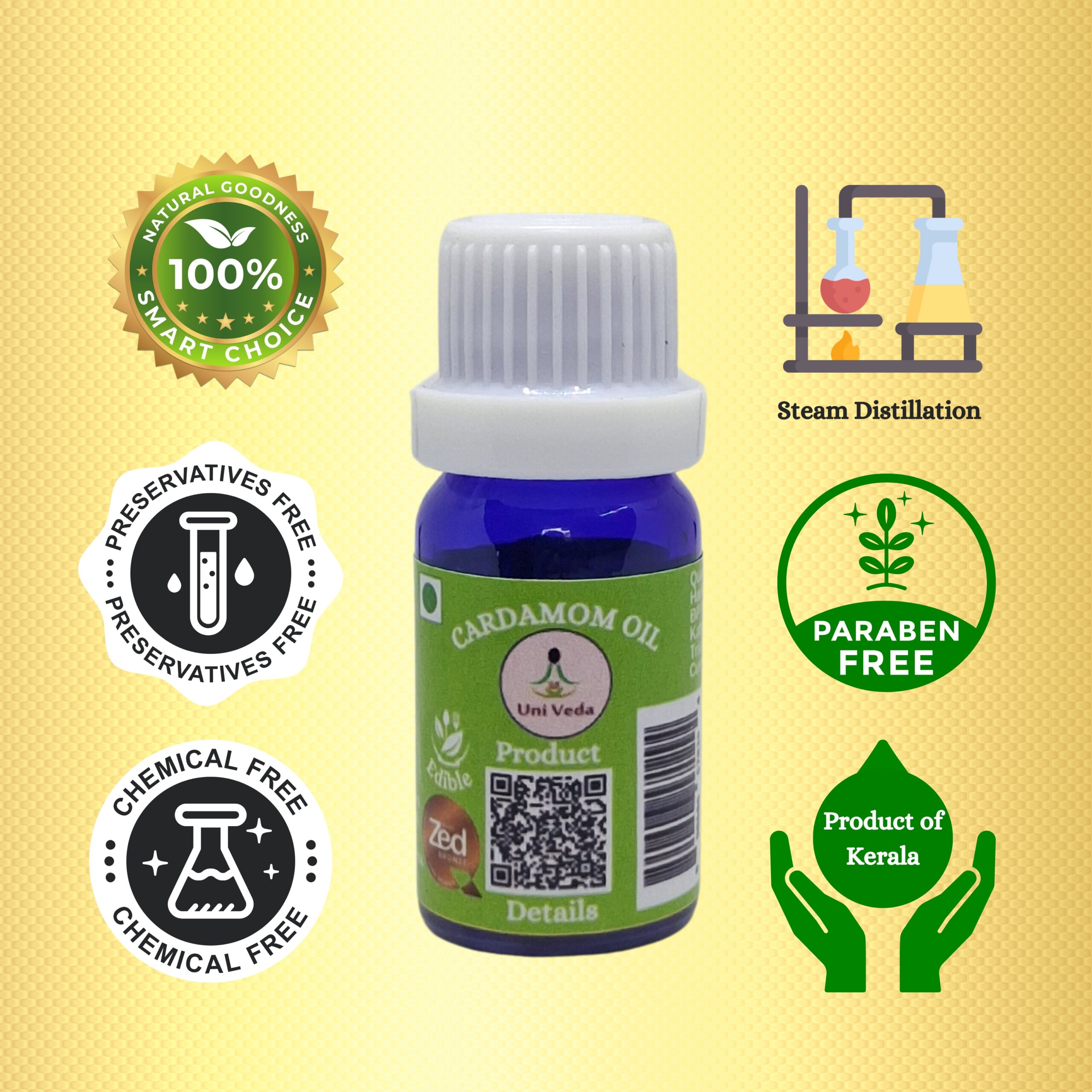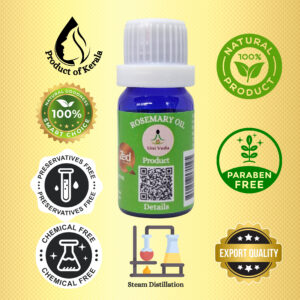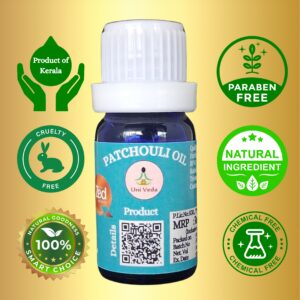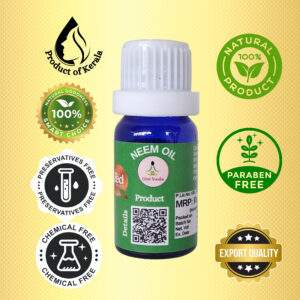OVERVIEW
Discover the Essence of Cardamom Essential Oil: Nature’s Aromatic Treasure
Cardamom essential oil, often hailed as the “Queen of Spices,” is a fragrant gem derived from the seeds of the Elettaria cardamomum plant. Native to the lush forests of India and Sri Lanka, cardamom has been cherished for centuries in Ayurvedic medicine and culinary traditions. This aromatic oil encapsulates the essence of the spice, offering a plethora of benefits that extend beyond its enticing aroma.
A Journey Through History
Cardamom’s rich history dates back over 4,000 years, making it one of the world’s oldest known spices. Ancient Egyptians used it for medicinal purposes and even as a key ingredient in their ritualistic incense blends. In traditional Chinese medicine and Ayurveda, cardamom was revered for its warming properties and ability to balance the body’s energies.
Extraction and Composition
Cardamom essential oil is extracted using steam distillation of the seeds, preserving its potent active compounds. The primary constituents include:
- Cineole (Eucalyptol): Offers respiratory support and has decongestant properties.
- α-Terpinyl Acetate: Contributes to its soothing effects and calming aroma.
- Limonene: Known for its antioxidant qualities and uplifting scent.
Incorporating Cardamom Essential Oil into Daily Life
Aromatherapy Uses:
- Diffuse for Relaxation: Add a few drops to your diffuser to create a calming atmosphere that promotes mental clarity and emotional balance.
- Inhalation: Inhale directly or use in steam inhalation to relieve respiratory discomfort.
Topical Applications:
- Massage Oil: Dilute with a carrier oil like coconut or jojoba oil for soothing muscle massages. A suggested blend:
- 2 tablespoons carrier oil
- 3 drops cardamom essential oil
- 2 drops ginger essential oil for added warmth
- Skincare Products: Incorporate into lotions or creams to benefit from its skin-enhancing properties.
Culinary Adventures:
- Flavor Enhancer: Food-grade cardamom oil can be used sparingly to add exotic flavor to teas, baked goods, and savory dishes.
Why Cardamom Essential Oil Stands Out
Unlike other essential oils, cardamom offers a unique combination of warmth and freshness. Its versatility makes it a valuable addition to any essential oil collection. Whether you’re seeking natural remedies for physical ailments or ways to enhance emotional well-being, cardamom essential oil provides a harmonious balance of benefits
INGREDIENTS
Cardamom essential oil, derived from the seeds of the Elettaria cardamomum plant, is a treasure trove of natural compounds. Here are the key ingredients that make this essential oil a powerhouse of benefits:
Primary Components
- 1,8-Cineole (Eucalyptol): Approximately 55.4% of the oil’s composition. Known for its respiratory support and decongestant properties.
- α-Terpinyl Acetate: Contributes to the oil’s soothing effects and calming aroma.
- Limonene: An antioxidant that adds an uplifting scent.
Other Notable Ingredients
- Monoterpenes: Oxygenated monoterpenes make up around 63% of the oil, providing various therapeutic benefits.
- Alcohols and Esters: These compounds enhance the oil’s antimicrobial and anti-inflammatory properties.
Extraction Method
Cardamom essential oil is typically extracted through steam distillation, a process that ensures the preservation of its natural compounds
GUIDE
Cardamom essential oil is a versatile and aromatic oil that offers a multitude of benefits for the mind, body, and spirit. Derived from the seeds of the Elettaria cardamomum plant, this essential oil is cherished for its warm, spicy fragrance and therapeutic properties. Here’s how you can incorporate natural cardamom essential oil into various aspects of your daily life.
1. Aromatherapy and Diffusion
Elevate Your Environment:
- Stress Reduction: Diffusing cardamom oil can help reduce stress and promote relaxation.
- Mental Clarity: Enhances focus and combats mental fatigue.
How to Use:
- Diffuser:
- Add 4-6 drops of cardamom oil to your diffuser.
- For an invigorating blend, combine with oils like peppermint or lemon.
- Inhalation:
- Place a drop on a tissue or inhale directly from the bottle.
2. Respiratory Support
Breathe Easier:
- Decongestant: Clears airways and alleviates symptoms of colds and allergies.
- Expectorant: Helps loosen mucus and soothe coughing.
How to Use:
- Steam Inhalation:
- Fill a bowl with hot water.
- Add 2 drops of cardamom oil.
- Lean over the bowl, cover your head with a towel, and inhale the steam.
- Chest Rub:
- Mix 5 drops of cardamom oil with 1 tablespoon of carrier oil.
- Massage onto the chest and throat area.
3. Digestive Aid
Soothe Your Stomach:
- Relieves Indigestion: Eases bloating, gas, and stomach discomfort.
- Stimulates Appetite: Encourages healthy digestion.
How to Use:
- Abdominal Massage:
- Combine 4 drops of cardamom oil with 1 tablespoon of carrier oil.
- Gently massage the abdomen in a clockwise motion.
- Tea Enhancement:
- Add a single drop of food-grade cardamom oil to herbal tea.
Note: Ensure the oil is food-grade before ingestion.
4. Natural Perfumery
Create Your Signature Scent:
- Unique Fragrance: Offers a warm, spicy aroma that’s both exotic and soothing.
How to Use:
- Personal Perfume Blend:
- In a 10ml roller bottle:
- Fill with a carrier oil like jojoba.
- Add 5 drops of cardamom oil.
- Optional: Add 3 drops of vanilla or jasmine oil.
- Apply to pulse points for a long-lasting fragrance.
5. Massage Therapy
Relax Muscles and Joints:
- Anti-Inflammatory: Reduces muscle soreness and joint pain.
- Antispasmodic: Relieves muscle spasms.
How to Use:
- Massage Oil:
- Mix 5 drops of cardamom oil with 2 tablespoons of carrier oil.
- Massage onto affected areas.
- Enhance Relaxation:
- Combine with lavender or chamomile oil for added calming effects.
6. Skincare Enhancements
Revitalize Your Skin:
- Antiseptic Properties: Helps heal minor wounds and prevent infections.
- Improves Complexion: Promotes clear and radiant skin.
How to Use:
- Facial Serum:
- Add 2 drops of cardamom oil to your moisturizer or carrier oil.
- Apply gently to the face and neck.
- Bath Soak:
- Add 5 drops to a warm bath along with Epsom salts.
7. Culinary Uses
Spice Up Your Dishes:
- Flavoring Agent: Adds depth and warmth to a variety of recipes.
How to Use:
- Baking:
- Incorporate a drop into cookie or cake batter for a spicy twist.
- Beverages:
- Add a minimal amount to coffee, tea, or smoothies.
Important: Only use food-grade essential oil and consult dosage guidelines.
8. Emotional Well-Being
Boost Your Mood:
- Antidepressant Effects: Alleviates feelings of depression and anxiety.
- Enhances Happiness: Promotes a sense of contentment.
How to Use:
- Inhalation:
- Inhale directly from the bottle when feeling low.
- Diffuser Blends:
- Combine with uplifting oils like orange or grapefruit.
9. Hair Care
Nourish Your Locks:
- Stimulates Hair Growth: Improves circulation to the scalp.
- Adds Shine: Leaves hair looking healthy and vibrant.
How to Use:
- Scalp Massage:
- Mix 3 drops of cardamom oil with 2 tablespoons of carrier oil.
- Massage into the scalp before shampooing.
- Conditioner Boost:
- Add a drop to your conditioner for added benefits.
10. Household Freshener
Naturally Scent Your Home:
- Air Purifier: Eliminates odors and refreshes the atmosphere.
How to Use:
- Room Spray:
- In a spray bottle, mix:
- 1 cup distilled water
- 15 drops of cardamom oil
- Optional: Add 10 drops of citrus oil for a fresh scent.
- Spray around your home as needed.
- Potpourri:
- Add a few drops to dried flowers or potpourri bowls.
11. Meditation and Yoga
Enhance Mindfulness Practices:
- Increases Focus: Sharpens concentration during meditation.
- Promotes Relaxation: Creates a calming environment.
How to Use:
- Diffusion:
- Diffuse in your meditation space.
- Yoga Mat Spray:
- Mix water, witch hazel, and cardamom oil in a spray bottle.
- Lightly mist your yoga mat before practice.
12. DIY Beauty Products
Craft Your Own Skincare:
- Body Scrub:
- Combine:
- 1 cup sugar or salt
- ½ cup coconut oil
- 10 drops of cardamom oil
- Use to exfoliate and moisturize the skin.
- Lip Balm:
- Melt beeswax and mix in coconut oil and cardamom oil.
- Pour into containers and let solidify.
13. Immune System Support
Strengthen Your Defenses:
- Antimicrobial Properties: Helps fight off infections.
How to Use:
- Topical Application:
- Dilute and apply to the soles of your feet.
- Diffusion:
- Diffuse during cold and flu season to purify the air.
14. Digestive Support Tea
Soothe Internally:
- Herbal Tea Infusion:
- Add a drop of food-grade cardamom oil to herbal tea.
- Sip slowly to ease digestive discomfort.
15. Emotional Balancing
Restore Equilibrium:
- Hormonal Balance: May help alleviate symptoms of PMS and hormonal fluctuations.
How to Use:
- Aromatic Bath:
- Add cardamom oil to bathwater.
- Massage Blend:
- Combine with clary sage and carrier oil for a balancing massage.
Frequently Asked Questions (FAQ) About Natural Cardamom Essential Oil
1. What Is Natural Cardamom Essential Oil?
Answer: Natural cardamom essential oil is derived from the seeds of the Elettaria cardamomum plant, commonly known as green or true cardamom. Through a process of steam distillation, the tiny aromatic seeds yield an oil rich in warm, spicy, and sweet notes. This essential oil is cherished in aromatherapy and traditional practices for its potential to support digestive health, respiratory comfort, and emotional balance.
2. What Are the Main Benefits of Cardamom Essential Oil?
Answer: Cardamom essential oil is renowned for several potential benefits:
- Digestive Support: May help alleviate indigestion, bloating, and stomach discomfort.
- Respiratory Health: Its invigorating aroma could aid in easing coughs and congestion.
- Emotional Well-being: Often used to reduce stress and enhance mental clarity.
- Antimicrobial Properties: Contains compounds that may combat certain bacteria and fungi.
- Anti-inflammatory Effects: Potentially soothes muscle aches and joint discomfort.
- Aphrodisiac Qualities: Traditionally believed to enhance sensuality and intimacy.
Please note that while cardamom essential oil has these traditional uses, individual results may vary, and it’s important to consult with a healthcare professional for personalized advice.
3. How Do I Use Cardamom Essential Oil?
Answer: There are various ways to incorporate cardamom essential oil into your daily routine:
- Aromatherapy Diffusion:
- Add 4-6 drops to a diffuser to fill your space with its uplifting scent.
- Blend with citrus oils like orange or lemon for an invigorating aroma.
- Topical Application:
- Dilute 2-3 drops with a tablespoon of carrier oil (e.g., coconut or jojoba oil).
- Massage into the abdomen for digestive comfort or onto muscles for soothing relief.
- Inhalation:
- Add a few drops to a bowl of hot water, cover your head with a towel, and inhale the steam carefully.
- Bath Enhancement:
- Mix 5 drops with Epsom salts and add to warm bathwater for relaxation.
Always perform a patch test before topical use to ensure you don’t have an allergic reaction. Avoid applying undiluted oil directly to the skin.
4. Can I Ingest Cardamom Essential Oil?
Answer: Ingesting essential oils is generally not recommended without guidance from a qualified healthcare professional or certified aromatherapist. While cardamom is a culinary spice, the essential oil is highly concentrated and could pose risks if consumed improperly. For culinary purposes, it’s safer to use the spice itself or food-grade extracts.
5. Is Cardamom Essential Oil Safe During Pregnancy?
Answer: Pregnant or nursing individuals should exercise caution with essential oils. It’s advisable to consult a healthcare professional before using cardamom essential oil during pregnancy or breastfeeding to ensure safety for both mother and child.
6. Does Cardamom Essential Oil Help with Digestive Issues?
Answer: Cardamom essential oil has traditionally been used to support digestive health. When diluted and massaged onto the abdomen, it may help ease indigestion, gas, and bloating. However, it’s important to consult with a healthcare provider for persistent digestive concerns.
7. Can Cardamom Essential Oil Improve Respiratory Health?
Answer: The warming and invigorating aroma of cardamom essential oil may provide temporary relief from minor respiratory discomfort when inhaled. It can be used in steam inhalation to help clear nasal passages. This should complement, not replace, medical treatments prescribed by a healthcare professional.
8. How Does Cardamom Essential Oil Affect Mood?
Answer: Cardamom essential oil is often used in aromatherapy to promote emotional balance. Its soothing scent may help reduce feelings of stress, anxiety, and mental fatigue, contributing to improved mood and focus.
9. Can I Blend Cardamom Essential Oil with Other Essential Oils?
Answer: Absolutely! Cardamom essential oil blends exceptionally well with various oils:
- Citrus Oils: Combine with bergamot, orange, or lemon for an uplifting atmosphere.
- Floral Oils: Blend with lavender or jasmine to enhance relaxation.
- Spice Oils: Mix with ginger, cinnamon, or clove for a warm, inviting scent.
- Woodsy Oils: Pair with cedarwood or sandalwood for grounding effects.
Experimenting with blends can enhance both the aromatic experience and potential benefits.
10. Is Cardamom Essential Oil Safe for Children and Pets?
Answer: Caution is advised when using essential oils around children and pets:
- Children: Essential oils are potent; consult a pediatrician before use. If approved, use minimal amounts and ensure proper dilution.
- Pets: Some essential oils can be harmful to animals. Consult a veterinarian before diffusing or applying cardamom oil in pet-friendly spaces.
11. How Should I Store Cardamom Essential Oil?
Answer: To preserve its quality:
- Cool, Dark Place: Store in a cool area away from direct sunlight and heat.
- Secure Container: Keep the oil in a tightly sealed dark glass bottle to prevent oxidation.
- Shelf Life: When stored properly, cardamom essential oil can last up to two years.
12. Does Cardamom Essential Oil Have Antimicrobial Properties?
Answer: Cardamom essential oil contains compounds that exhibit antimicrobial activity in certain settings. It may help inhibit the growth of some bacteria and fungi. However, it should not be relied upon as a sole method for disinfecting or treating infections.
13. Can Cardamom Essential Oil Be Used for Skin Care?
Answer: When properly diluted, cardamom essential oil can be incorporated into skincare routines:
- Benefits: May help improve complexion and soothe minor skin irritations.
- Usage: Add a few drops to a carrier oil and apply to the skin.
Perform a patch test first to check for any adverse reactions, and avoid using on sensitive or broken skin.
14. Is Cardamom Essential Oil Good for Hair Care?
Answer: Cardamom essential oil may promote scalp health:
- Scalp Massage: Diluting the oil and massaging it into the scalp could help invigorate hair follicles.
- Aromatic Experience: Adds a pleasant scent to hair care products.
Ensure the oil is properly diluted and avoid contact with the eyes.
15. How Does Cardamom Essential Oil Compare to Other Essential Oils?
Answer: Cardamom essential oil stands out due to its unique combination of spicy and sweet aromas and its versatility:
- Compared to Lavender: While lavender is predominantly calming, cardamom offers both invigorating and soothing properties.
- Compared to Peppermint: Peppermint is cooling, whereas cardamom provides a warming sensation.
Choosing the right oil depends on the desired effect and personal preference.






Reviews
There are no reviews yet.